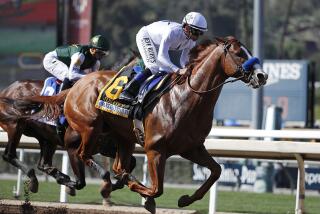Landis’ defense on attack
- Share via
It was supposed to be the case against American cyclist Floyd Landis, but from opening statements through early testimony it was also the case against a controversial Paris lab.
And the challenge is likely to continue throughout the public hearings that opened Monday in Malibu into allegations that Landis used performance-enhancing drugs to win the 2006 Tour de France.
A Cornell University scientist said he was “very favorably impressed” by the Paris lab, which he strongly defended.
But later, under cross-examination, nutritional science professor J. Thomas Brenna acknowledged receiving a $1.3-million grant last year from the same organization that is prosecuting the charges against Landis — the U.S. Anti-Doping Agency (USADA).
Questions about the Paris lab’s proficiency are at the heart of the Landis defense. He faces a possible two-year suspension and loss of the Tour de France title if convicted of drug use. The Paris lab declared one of his urine samples positive for illicit testosterone use at the end of the race.
Defense lawyer Maurice Suh launched the Landis attack on the lab from his opening remarks, blaming what he called faulty readings on shoddy handling, analysis and interpretation of test samples. The charges against Landis, he said, were the result of “an intersection of incompetence” by USADA and the lab.
Lead USADA lawyer Richard Young argued in his opening statement that levels of testosterone found in the racer’s samples defied “natural explanations.”
An international press corps is witnessing the hearings in a moot-court auditorium at Pepperdine University School of Law.
Also among spectators at the start were Landis’ parents, his wife, Amber, and former Los Angeles Mayor Richard Riordan, who said he was a friend of the racer and often shared rides with him in the hills overlooking the city.
The public hearing is unique; every other USADA arbitration has been held behind closed doors. Thanks to Landis’ prominence in the sports world and his determination to reverse roles — putting lab tests and anti-doping procedures on trial — it has become the most intensely contested case of its kind.
The witness list is among the lengthiest of any such hearing, with the heads of five WADA-accredited international doping labs scheduled to give testimony against the racer, including Don H. Catlin, who recently announced his retirement from the Olympic anti-doping lab at UCLA.
The arbitrators also are expected to hear from bicycling royalty, with three-time Tour de France winner Greg LeMond scheduled to testify against Landis and Belgian Eddy Merckx, a five-time winner, set to testify in his favor.
Landis also is expected to appear on his own behalf.
Much of the testimony at the hearing is likely to involve the minutiae of steroid metabolism and organic chemistry. Brenna of Cornell told the panel that the lab went out of its way to ensure that the equipment used to analyze the racer’s urine samples was in proper working order.
“They inserted controls at virtually every level where one might insert controls,” he said. Brenna is an expert in carbon isotope ratio mass spectrometry, the analytical technique used by the lab in declaring Landis’ urine samples positive.
Under cross-examination, Brenna acknowledged that the lab made several erroneous measurements of control samples during analysis of Landis’ samples.
Another point of contention arose over assertions by USADA attorney Young that the lab’s disputed test results on a Landis sample after Stage 17 of the grueling race were corroborated.
Of seven samples taken at other stages and retested last month over Landis’ objection, Young said, four showed evidence of testosterone abuse. However, previous tests conducted during the race by the Paris lab had found all those samples were clean. Young did not explain the discrepancy Monday.
In his opening statement, Suh charged that USADA had “cherry-picked” the results it presented to the arbitrators to suggest that the lab’s analyses of Landis’ samples were more consistent than they were; in fact, he said, the lab had to rerun tests numerous times to obtain positive results.
“Make no mistake about it, this case is an utter disaster for the anti-doping movement,” Suh said.
He also noted statistics showing that the Paris lab reports positive results at three times the rate of other WADA labs.
“Are there three times as many dopers in France?” he asked. “Maybe those athletes didn’t have the opportunity, as Mr. Landis has, to prove their innocence.”
michael.hiltzik@latimes.com
More to Read
Go beyond the scoreboard
Get the latest on L.A.'s teams in the daily Sports Report newsletter.
You may occasionally receive promotional content from the Los Angeles Times.









